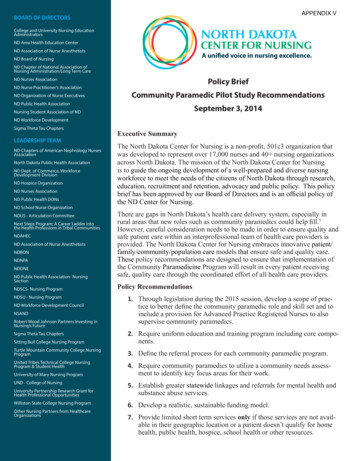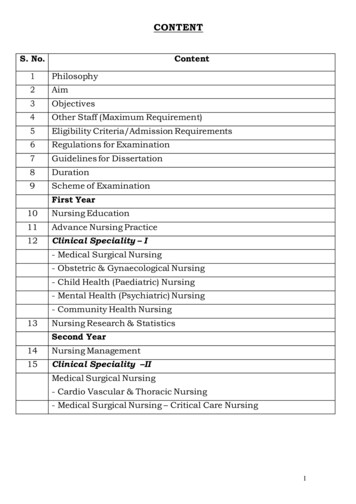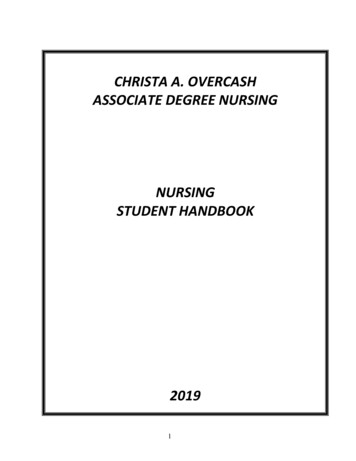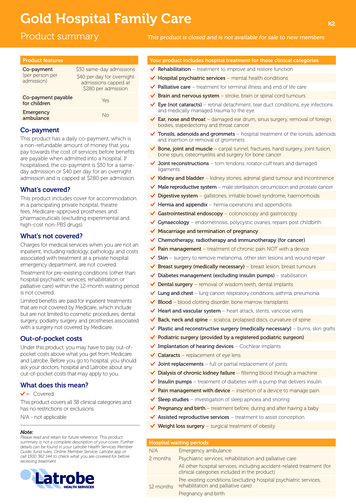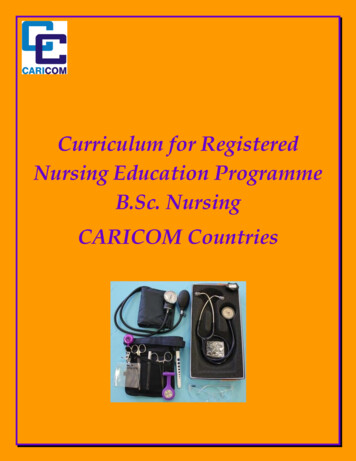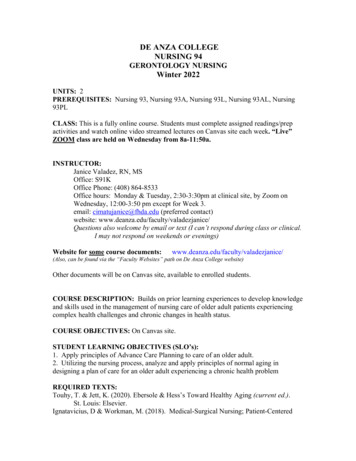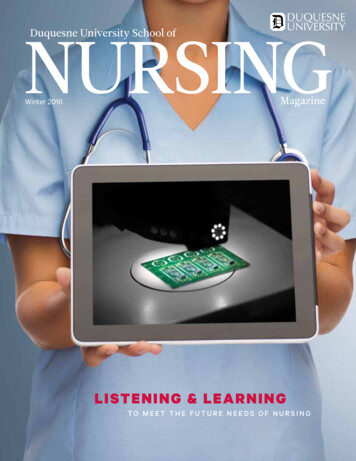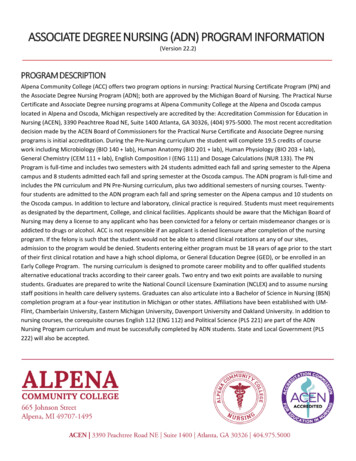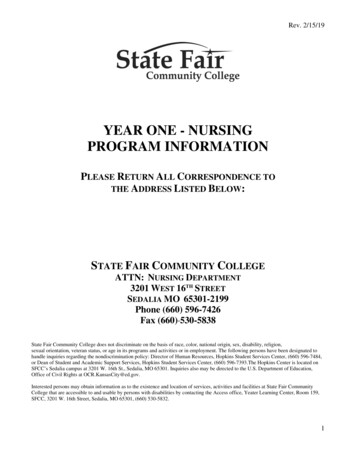
Transcription
Rev. 2/15/19YEAR ONE - NURSINGPROGRAM INFORMATIONPLEASE RETURN ALL CORRESPONDENCE TOTHE ADDRESS LISTED BELOW:STATE FAIR COMMUNITY COLLEGEATTN: NURSING DEPARTMENT3201 WEST 16TH STREETSEDALIA MO 65301-2199Phone (660) 596-7426Fax (660) 530-5838State Fair Community College does not discriminate on the basis of race, color, national origin, sex, disability, religion,sexual orientation, veteran status, or age in its programs and activities or in employment. The following persons have been designated tohandle inquiries regarding the nondiscrimination policy: Director of Human Resources, Hopkins Student Services Center, (660) 596-7484,or Dean of Student and Academic Support Services, Hopkins Student Services Center, (660) 596-7393.The Hopkins Center is located onSFCC’s Sedalia campus at 3201 W. 16th St., Sedalia, MO 65301. Inquiries also may be directed to the U.S. Department of Education,Office of Civil Rights at OCR.KansasCity@ed.gov.Interested persons may obtain information as to the existence and location of services, activities and facilities at State Fair CommunityCollege that are accessible to and usable by persons with disabilities by contacting the Access office, Yeater Learning Center, Room 159,SFCC, 3201 W. 16th Street, Sedalia, MO 65301, (660) 530-5832.1
Rev. 2/15/19State Fair Community College’s Bi-level Associate Degree Nursing program makes the transition from Practical NursingProgram (PN) to Associate Degree Nursing (ADN) a smooth process, decreasing the repetition of course information.Year One of the SFCC Bi-level Associate Degree Nursing Program meets the requirements of the Missouri State Boardof Nursing for Practical Nursing. The program has full approval by Missouri State Board of Nursing. This means thatALL students, upon completion of the first year of the nursing program will be applying to take the LPN licensure exam.Upon successful passing of the LPN licensure exam (after the first year), these students may continue into Year Two ofthe program without having to reapply. Students who choose not to continue to Year Two at that time will need toreapply and meet the admission criteria for Advanced Placement to complete the Associate Degree of Nursing Program(become an RN).Year One (LPN component) Program Offerings (please note application ySedaliaAugustEldonJanuaryClass ScheduleProgramLengthMonday-Friday1 year(morning-afternoon)Monday-Friday1 year(morning-afternoon)Monday-Friday1 tedOnGroundOnGroundOnGround25ApplicationDeadline forFullAdmissionConsiderationOctober 136May 125October 1Full Admission Process: You may submit your nursing application ifo you have completed all prerequisite courses ORo you are currently taking your final prerequisite course work Nursing applications must be submitted online through MyStar (Access is provided upon acceptance to SFCC) Applications are reviewed by the Nursing Admission Committee once all application criteria is completed.o Your application will be considered complete when official transcripts have been submitted all prerequisite courses are complete CPR certification card has been submitted Beginning in fall 2020, CPR certification will be eliminated as an applicationrequirement. Documentation of certification that extends through program completionwill be required following program acceptance. A CPR certification course will beoffered prior to program entry. ATI TEAS test score meets admission criteria (Adjusted Total Individual Score of 58.7 percent orhigher)o Applications that are incomplete will not be considered for admission.o Applications submitted but not completed will be held no more than one year from date ofsubmission. Admission to the Nursing Program is on a first-qualified, first-admitted basis. When a class is full, subsequentqualified applications will be accepted for the next available class at the designated campus. Should a positionbecome open in an earlier class, the next eligible student will be notified. Students will be notified of acceptance to the program by email. All correspondence with you is through SFCCstudent e-mail, so be sure to check your student e-mail account regularly. Applicants are accepted into the program pending a satisfactory background check, a negative drug screening andcompletion of all required immunizations. Any applicant who has been convicted of felonies and/ormisdemeanors must discuss this matter with the Nursing Program Director. SFCC nursing application process does not have alternates.2
Rev. 2/15/19Contingent Admission Contingent admission will be offered if, after the stated application deadline, a class is not full. Contingent admission will be offered to applicants who have met all admission criteria by the end of the semester. Completed applications received after the deadline will only be considered if all contingent seats have not beenfilled.Final admission to program will occur when all admission criteria has been met and completed, and reviewed by theNursing Admission Committee.Students should see the assigned Pre-Nursing Navigator for assistance in planning for program admission. Informationabout Navigator advising can be found at .If you have questions, please contact Courtney Moon, Admissions & Advisement Coordinator for the NursingDepartment, at 660-596-7426.The following information can be found at www.sfccmo.edu: Advanced placement policies Student services Refund policy Financial assistance**** see next page for admission requirements****3
Rev. 2/15/19Requirements for Admission into theYear One Practical Nursing Program Admission to State Fair Community College (SFCC) Students can apply online free at www.sfccmo.edu/admissions Application to SFCC Nursing Program Students apply online free on MyStar Access to MyStar is obtained upon acceptance to SFCC Application can be accessed under the Student tab in MyStar I need to Submit or check statusof nursing program application The following information should be uploaded with your application either upon initial application orat a later date ATI Test of Essential Skills (TEAS) results Current (unexpired) American Heart Association CPR Card for Health Care Providers Beginning in fall 2020, CPR certification will be eliminated as an applicationrequirement. Documentation of certification that extends through programcompletion will be required following program acceptance. A CPR certificationcourse will be offered prior to program entry. SFCC Nursing Program Applications may be submitted: Once you have completed all prerequisite courses OR You are currently taking your final prerequisite course work Prerequisite Courses (additional prerequisite course work may be required based on placement exams) Intermediate Algebra or higher - 3 credit hours (with a C or higher) The following mathematics courses will be accepted: MATH 110, MATH 112, MATH 113,MATH 114, MATH 116, MATH 117, MATH 119, MATH 120, MATH 122, MATH 125,MATH 127, (or) MATH 131 English Composition I or English Composition II - 3 credit hours (with a C or higher) Human Anatomy - 4 credit hours with lab (with a B or higher) must have been completed within the last 10 years at the time of application to the nursingprogram Required General Education Courses (can be taken prior to starting program or within program) Human Physiology - 4 credit hours with lab (with a B or higher) must have been completed within the last 10 years at the time of application to the nursingprogram must be successfully completed with a B or higher during the first semester of Year One ifnot already taken General Psychology - 3 credit hours (with a C or higher) must be successfully completed with a C or higher during the third semester of Year One ifnot already taken Microbiology - 4 credit hours with lab (with a B or higher) must have been completed within the last 10 years at the time of application to the nursingprogram must be successfully completed during the first semester of Year Two if not already taken Public Speaking - 3 credit hours (with a C or higher) must be successfully completed during the second semester of Year Two if not already taken History - 3 credit hours (with a C or higher) US History Before 1877, US History Since 1877, or American/National Government must be successfully completed during the second semester of Year Two if not already taken students who have completed a history course outside the state of Missouri or a history coursein Missouri that does not meet the Missouri Constitution requirements will be required topass the Missouri Constitution course (POLS 102) in order to qualify for graduation4
Rev. 2/15/19NOTE: If you have taken an Anatomy and Physiology I (A/P) (4 credit hours) or Anatomy and Physiology II course(A/P) (4 credit hours) from an accredited higher education institution, this does not satisfy the requirements of eitherAnatomy or Physiology courses that are required by this program. If your transcript indicates BOTH A/P I AND A/PII courses with a “B” or higher, this will satisfy the Anatomy and Physiology requirements of this program. If astudent takes A/P I and A/P II and one of the grades for these are lower than a “B”, the student must repeat thatcourse or take SFCC’s separate Anatomy and Physiology courses. All required (including prerequisites for theprogram) science courses must meet the requirement of having been completed within the last 10 years at the time ofapplication to the State Fair Community College Associate Degree Nursing Program. Current (unexpired) American Heart Association CPR card for Health Care Providers Certification course is offered at SFCC Card must be current at time of application and remain current until the program is started A BLS recertification class will be required immediately before the start of your program if your BLScard will expire before you complete the program. This will be scheduled for you if needed. American Red Cross certification will NOT be accepted Beginning in fall 2020, CPR certification will be eliminated as an application requirement.Documentation of certification that extends through program completion will be requiredfollowing program acceptance. A CPR certification course will be offered prior to programentry. Pre-entrance Exam ATI Test of Essential Academic Skills (TEAS)Must earn an Adjusted Total Individual Score of 58.7 percent or higherExam must be taken less than one year before application is submitted and reviewedMust wait 45 days between testing datesSFCC administers this test Additional information on registration and testing resources are available on the SFCCTesting Center website ests/ati-teas/ Registration and cost information is available online at www.atitesting.com. Choose ATI TEAS for Nursing when registering If test is completed at a testing center other than SFCC, the student must provide an official TEAStranscript from ATI. Official transcript can be purchased from the ATI online store atwww.atitesting.com/ati store/ Unofficial TEAS results taken from a testing center besides SFCC will not be accepted. GPA Requirements 2.75 GPA for program requirements Includes pre-requisites and required general education classes taken prior to acceptance(based upon 4.0 system) Includes nursing courses accepted toward degree completion such as a Nutrition class orFundamentals I. If two grades exist for a required course on the transcript, the higher of the two grades will beused for the GPA computation. The GPA will be figured to the one hundredth position, such as 3.45 or 2.54, and not roundedbeyond that point; for example, a 2.46 will not be rounded to 2.5. 2.5 GPA (overall) for all college level course work Overall GPA will be computed by the SFCC registrar’s office. The GPA will be figured to the one hundredth position, such as 3.45 or 2.54, and not roundedbeyond that point; for example, a 2.46 will not be rounded to 2.5. An applicant not meeting the GPA requirements during admissions committee review will receive aletter to that effect.5
Rev. 2/15/19 The applicant is then returned to the applicant pool and retains the original application datebut will not be reviewed until GPA requirements are met. The applicant will contact the nursing department when their GPA meets or exceedsrequirements. The applicant will be given two years to raise their GPA before being required to reapply tothe program. The applicant will not need to retake the ATI TEAS since their application date remains ineffect.Beginning in fall 2020, CPR certification will be eliminated as an application requirement. Once applicant has beenaccepted, the student will need to successfully pass NURS 102 CPR for Health Care Providers (AHA) in the semesterprior to the start of the nursing program or provide documentation of certification that will be valid throughout programcompletion.To progress from Year One to Year Two the student must have: Successful completion of Year One PN program within immediate previous semester Successful passing of NCLEX-PN prior to the beginning of the second 8-week term of the first semester of YearTwoSuccessful completion of the Nursing Program does not guarantee eligibility to take the PN NCLEX licensure exam.For questions, contact:Courtney MoonNursing Department Admissions & Advisement Coordinatorcmoon@sfccmo.eduPhone: 660-596-7426Toll Free: 877-311-7322Fax: 660-530-58386
Rev. 2/15/19Nursing Program Re-entry PolicyStudents who withdraw from the SFCC Nursing Program may be considered for re-entry to the program underthe following conditions: If withdrawal was due to extenuating circumstance, i.e. ill health, family problems, etc.Failure to maintain the required grade or pass NCLEX-PNThe student who is non-compliant with program, course, or clinical remediation requirements will not beconsidered for re-entry.The remediation plan will focus on covering the material of the failed course (or the areas below or nearpassing on NCLEX-PN).The student must complete all remediation requirements as assigned in the remediation plan and by the duedate assigned to show improvement to demonstrate the candidate’s ability to succeed.Additional areas outside of the failed course material may be included in the remediation plan for practice toensure that a student continues to be prepared for NCLEX.Upon completion of the remediation plan, the faculty will review the candidate’s ability to succeed and makea recommendation regarding readmission.The remediation plan will be completed by the deadline provided in the remediation plan (prior toreadmission) in order for any additional testing to be performed and the faculty admissions meeting to takeplace.A course remediation rubric will be used to inform the remediating student of their progress duringremediation. This remediation rubric scores will be considered by the Admission Committee when thestudent petitions to return to the program.Students who have withdrawn (or been dismissed) because of failure to maintain the required grades in asemester may be eligible to start classes for the next upcoming program, as long as there is evidence of potentialfor success (i.e. remediation efforts, other coursework that might assist the student with areas of need, etc.).Students will only be admitted one time after successful remediation. A second academic withdrawalprohibits readmission to the program. Readmission after dismissal is neither automatic nor a guarantee,and will be considered favorably only when a student’s remediation performance indicates a strongprobability for academic success. Re-entry will be considered on an individual student basis.At the time of withdrawal, the student and Nursing Director and/or Nursing Student Success Coordinator willagree in writing on the specific guidelines and conditions that must be met for re-entry to the program.Remediation plans are developed by the Nursing Student Success Coordinator in consultation with the NursingDirector.7
State Fair Community CollegeAssociate Degree Nursing ProgramMission StatementThe mission of the Associate Degree Nursing Program is to prepare students to become registeredprofessional nurses through a bi-level program. The aim of the educational environment is to useevidence-based practice to develop clinical reasoning. The program uses technology and qualityimprovement principles to enhance patient care. A holistic view of health care encourages growth of theindividual student to enhance inter-professional partnerships and promote cultural vitality in thecommunities they serve. Learning is a lifelong process that results in behavioral change and is mosteffective as a shared responsibility.PhilosophySFCC’s Nursing Department is dedicated to upholding the college’s belief in the inherent value of eachindividual and enabling our learners to develop their talents, reach their educational goals, and becomelife-long learners who make a positive contribution to their community. At SFCC, nursing is consideredvery much an art and science. To meet local and regional nursing workforce needs for LicensedPractical Nurses and Registered Nurses, the SFCC Nursing Program utilizes Year One competencies tomeet Missouri State Board of Nursing Minimum Standards for Practical Nurses. Year Twocompetencies build on this to meet the Missouri State Board of Nursing Minimum Standards forRegistered Nurses.The program utilizes the nursing process to ensure individualized quality patient care. Aware of eachclient’s unique genetic and cultural background, the nursing process is adaptable to individual needs andcircumstances. Nursing involves individuals who are critical thinkers, caring, conscientious, ethical,flexible, professional, life-long learners, and accountable for their actions. Classroom and clinicalexperiences are designed to progressively move the learner from the simple to more complex conceptsand procedures.Nursing impacts the human response to illness and health and intervenes at three levels of clientwellness: maintenance, restoration, and prevention of illness. By using Gordon’s Functional HealthPatterns, the nursing process incorporates the health status of the whole person; physiological, spiritual,social, and psychological. Clients are recognized as individuals, families, and communities. Nursesfacilitate client progress toward their optimal health status utilizing leadership principles and guided byindividual state nurse practice acts, Standards of Practice, and other regulatory principles.The program is accredited by the Department of Elementary and Secondary Education, StateDepartment of Higher Education and has full approval by the Missouri State Board of Nursing.Revised 3/188
State Fair Community CollegeEssential Qualifications for Associate Degree Nursing ProgramYear One and Year TwoThe following essential qualifications address the physical, cognitive, attitudinal and behavioral abilitiesessential to the nursing program at State Fair Community College. Students must meet these essentialqualifications in order to be admitted and retained in the program. Students with documented disabilitieswho wish to request reasonable accommodations under the American with Disabilities Act must followthe college’s procedure for requesting accommodations. The college reserves the right to reject requestsfor accommodations that would fundamentally alter the nature of an educational program, lower theacademic standards, cause an undue hardship on the college, or endanger the health or safety of astudent with a disability, other students, or any other member of the college community.State Fair Community College Associate Degree Nursing signifies that the holder of that program mayapply for licensure in the state of Missouri as a Licensed Practical Nurse after Year One and as anRegistered Nurse after Year Two and has been educated to competently enter nursing practice in allhealthcare settings as outlined in the Missouri State Board of Nursing Practice Act. The education of anassociate degree nurse requires the acquisition of substantial specialized skill, the assimilation ofknowledge and the ability to make appropriate judgments in healthcare settings. The practice of a nurseemphasizes collaboration among physicians, nurses, allied health care professionals, and the patient.The curriculum requires students to engage in diverse, complex, and specific experiences essential to theacquisition and practice of essential nursing skills and functions. Unique combinations of cognitive,affective, psychomotor, physical and social abilities are required to satisfactorily perform thesefunctions. In addition to being essential to the successful completion of the requirements of thecertificate in Practical Nursing or as a Registered Nurse, these functions are necessary to ensure thehealth and safety of patients, fellow candidates, faculty and other healthcare providers.The essential abilities necessary to acquire or demonstrate competence in a discipline as complex asnursing and needed for successful admission and continuance by candidates of the Practical Nursingprogram at State fair Community College include but are not limited to the following abilities.Motor SkillsCandidates should have sufficient motor function so that they are able to execute movements required toprovide general care and treatment to patients in all health care setting. Candidates should have theability to reach items overhead, stand for 8-12 hours, and lift 15-25 pounds of a client’s body weight.(For example: For the safety and protection of the patient, the candidate must be able to perform basiclife support, including CPR, and function in an emergency situation. The candidate must have theability, within reasonable limits, to safely assist a patient in moving, for example, from a chair to a bed,or from a wheelchair to a commode.)Sensory/ObservationA candidate must be able to acquire the information present through demonstrations and experiences inthe basic nursing sciences. He or she must be able to observe a patient accurately, and at a distance andclose at hand, and observe and appreciate non-verbal communications when performing nursingassessment and intervention or administering medications. The candidate must be capable of perceiving9
the signs of disease and infection as manifested through physical examination. Such information isderived from images of the body surfaces, palpable changes in various organs and tissues, and auditoryinformation (patient voice, hear tones, bowel and lung sounds).CommunicationThe candidate must communicate effectively and sensitively with other students, faculty, staff, patient,family, and other professionals. He or she must express his or her ideas and feelings clearly anddemonstrate a willingness and ability to give and receive feedback. A candidate must be able to conveyor exchange information at a level allowing development of a health history, identify problemspresented, explain alternative solutions, and give directions during treatment and post-treatment. Thecandidate must be able to communicate effectively in oral and written format. The candidate must beable to process and communicate information on the patient’s status with accuracy in a timely manner tomembers of the heath care team. The appropriate communication may also rely on the candidate’sability to make a correct judgment in seeking supervision and consultation in a timely manner.CognitiveA candidate must be able to measure, calculate, reason, analyze, integrate, and synthesize in the contextof practical nursing study. The candidate must be able to read and comprehend extensive writtenmaterial. He or she must also be able to evaluate and apply information and engage in critical thinkingin the classroom and clinical setting.Behavioral/EmotionalA candidate must possess the emotional health required for the full utilization of his or her intellectualabilities, the exercise of good judgment, the prompt completion of al responsibilities attendant to thediagnosis and care of patient and families. In addition, he/she must be able to maintain mature,sensitive, and effective relationships with patients, students, faculty, staff and other professionals underall circumstances including highly stressful situations. The candidate must have the emotional stabilityto function effectively under stress and to adapt to an environment that may change rapidly withoutwarning and/or in unpredictable ways. The candidate must be able to experience empathy for thesituations and circumstances others and effectively communicate that empathy. The candidate mustknow that his or her values, attitudes, beliefs, emotions, and experiences affect his or her perceptionsand relationships with others. The candidate must be able and willing to examine and change his or herbehavior when it interferes with productive individual or team relationships. The candidate mustpossess skills and experience necessary for effective and harmonious relationships in diverse academicand working circumstances.Professional Expectations“Professional behavior is manifest in person, acts and attitudes including elements of what wear, howwe perform, and how we think – if we make our thoughts and beliefs public It is how others seenursing that is so important to the nursing profession. And it is how others see us in our behavior toeach other as well as to our clients that defines us as professionals.” Veronica D. Feeg (Copyright 2001,Pediatric Nursing and Jannetti Publications, Inc. used with permission of the publisher.)Therefore, how one presents him or herself either elevates or diminishes their professional image in theeyes of others. We expect candidates to maintain the highest standards of professionalism in the10
classroom, all clinical settings, in any campus building or property, in the community, and in relatedpublic settings.Candidates must: Possess the ability to reason morally and practice nursing in an ethical manner Be willing to learn and abide by standards of practice for nursing Possess the attributes that include compassion, empathy, altruism, integrity, honesty,responsibility, and tolerance Be able to engage in patient care delivery in all settings Be able to deliver care to all patient populations including but not limited to children,adolescents, adults, developmentally disabled persons, medically compromised patients, andvulnerable adults.General professional behaviors to be exhibited in all areas at all times include:"Twelve Points on Professionalism" that can serve as a good reminder to us all of those subtle,interpersonal qualities we should reconsider from time to time. Be civil - Treat people with respect. Be ethical - Stand up for personal and professional standards. Be honest - Be forthright; do not participate in gossip and rumor. Be the best - Strive to be better than good. Be consistent - Behavior should coincide with values and beliefs. Be a communicator - Invite ideas, opinions, feedback from others. Be accountable - Take responsibility for your own actions. Be collaborative - Work in partnership with others for the benefit of patients. Be forgiving - Everyone makes mistakes; give people a fair chance. Be current - Keep knowledge and skills up to date. Be involved - Be active at local, state, and national levels. Be a model - What a person says and does reflects on his or her profession.(Adapted from Bruhn. J., in Nativio, 2001. Copyright 2001, Pediatric Nursing and JannettiPublications, Inc. Used with permission of the publisher.)11
Year 1 Practical Nursing Certificate – Spring admission (Program offered at Sedalia and Eldon campus)PrerequisitesBIO 207HumanAnatomy withLab (4)MATH 112IntermediateAlgebra (3)ENGL 101English Comp 1(3)NURS 102CPR (AHA)(0.5)ATI TEAS Test10.5 creditsJanuary-MarchMarch-MayBIO 208Human Physiology with lab * (4)(General Education Course, On-Ground)June-JulyNURS 134Nursing Care of the ChildBearing Family (2)August-OctoberNURS 124Adult Health II (4)NURS 126Adult Health Clinical (3)NURS 112Introduction to PsychoSocial Health (2)NURS 117Fundamentals II Theory(3)NURS 114Fundamentals I ** (2)NURS 118Fundamentals II Clinical(1.5)NURS 119Allied Health Pharmacology(3)NURS 122Adult Health I (4)NURS 136Child Bearing FamilyClinical (1.5)NURS 140Nursing Care for the ChildRearing Family (2)NURS 142Child Rearing FamilyClinical (1.5)NURS 110Personal VocationalConcepts (1)10 credits10.5 credits7 creditsNURS 132Nutrition (3)October-DecemberPSY 101General Psychology * (3)(General Education Course,Online)NURS 130Adult Health Care CoordinationClinical (2)NURS 128Adult Health III (2)HEOC 135Allied Health CareerDevelopment (0.5)10 credits7.5 creditsYear One Total Credit Hours: 45 including General EducationYear One Total Credit Hours: 55.5 including Prerequisites and General EducationYear 2 – Associate Degree Nursing (ADN)PrerequisitesPN LicensureJanuary-MarchNURS 213Introduction toProfessional Nursing(2)NURS 227Complex Health:Family (3)March-MayNURS 215Complex Health: MentalHealth (2.5)August-OctoberNURS 234Complex Health: Activity& Rest (3)October-DecemberNURS 219Complex Health:Elimination (3)NURS 221Complex Health:Nutrition/Metabolic (2.5)NURS 237Complex Health:Cognitive/Perceptual (3)NURS 243Professional Nursing CapstoneClinical (2.5)NURS 228Complex Health:Family Clinical (1)NURS 216Complex Health: MentalHealth Clinical (2)NURS 233Complex Health: AdultClinical III (3)NURS 230Complex Health:Adult Clinical I (1)NURS 231Complex Health:Adult Clinical II (1)History HIST 101 US History Before 1877, HIST 102 USHistory Since 1877, OR POLS 101 American/NationalGovernment * (3) (General Education Course, Online)BIO 121 Microbiology * (4)(General Educat
year one - nursing program information . p lease r eturn a ll c orrespondence to. the a ddress l isted b elow: s tate f air c ommunity c ollege attn: n ursing d epartment 3201 w est 16 th s treet. s edalia mo 65301-2199 . phone (660) 596-7426 . fax (660) 530-5838 .



